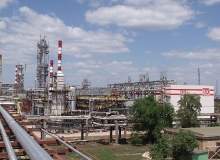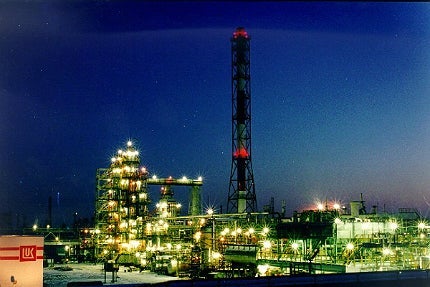

Located in Volgograd Oblast, southern Russia, Volgograd Oil Refinery is one of the four major refineries operated by LUKOIL in Russia. The refinery produces a range of fuels and lubricants, including gasoline, diesel, lubricants, fuel oil and jet fuel.
A modernisation and expansion project was completed at the refinery in 2016 to increase its production capacity and meet the Russian Government’s tightened fuel specifications.
The project increased the refinery’s capacity from 11 million tonnes per annum (Mtpa) to 15.7Mtpa, along with an increase in high-octane petrol production.
The facility’s oil refining depth was also increased from 83% to 95%.
Volgograd refinery crude supply, units and production
Volgograd refinery processes a blend of light West-Siberian and Lower-Volga crude oil, which is supplied via Samara-Tikhoretsk pipeline.
The refinery complex includes a 225,000 barrels per day (bpd) crude distillation unit, 68,200bpd vacuum distillation unit, 43,700bpd catalytic reformer, 18,500bpd coking unit and 95,900bpd catalytic hydro-treating unit.
Volgograd refinery produced 10.89Mt of petroleum products in 2012, including 39.6Mt of medium distillates, 12.4Mt of fuel oil, 18Mt of vacuum gas oil, 5.1Mt of lubricants and 18.9Mt of gasoline.
The refinery’s petroleum products are transported by road, rail and river.
History of Russia’s Volgograd oil refinery
TThe refinery has been operational since 1957, and first came under LUKOIL’s ownership in 1991. The complex has undergone a series of upgrades since then.
The initial refining and gasoline reforming units were rebuilt in 1994.
Automatic equipment for the blending of gasolines was introduced at the refinery in 1998, whereas diesel fuel hydro-treatment, naphtha stabilisation and saturated hydrocarbon gas fractioning facilities were launched between 1998 and 2001.
A lubricant-packaging line, storage facility for marketable lubricants, coke calcination facility and catalytic reforming unit were subsequently built by 2006.
A 380,000tpa isomerisation unit was commissioned at the refinery in 2007. A vacuum block on one of the distillation units was commissioned and a new gasoline blending facility was brought into operation the following year.
The refinery switched to the production of Euro-3 standard motor gasoline in 2008. It also started producing Euro-4 compliant diesel fuel, with sulphur content below 50ppm, from the middle of 2008.
An inert gas production unit and short-cycle absorption unit for concentrated hydrogen production were launched during 2009 and 2010.
Recent upgrades at LUKOIL’s southern Russian refinery
Construction of a delayed-coking unit at Volgograd refinery was completed towards the end of 2011, which allowed the facility to increase its annual oil-coke production capacity by 100,000t.
A new diesel-fuel hydro treatment unit with a capacity of three million tonnes per year was commissioned at the refinery in the third quarter of 2012.
In addition to producing diesel fuel, the unit has the capacity to hydrotreat 200,000t of coking gasoline per year, which is expected to increase the refinery’s high-octane gasoline output.
The refinery began producing Euro-5 compliant diesel fuel with sulphur content below 10ppm following the commissioning of the hydrotreatment unit.
Details of the ongoing refinery modernisation project
Volgograd refinery’s modernisation programme included the construction of a 6Mtpa primary refinery unit that was intended to replace two old units, a Vacuum Gasoil (VGO) Deep Conversion Complex and a Fluid Catalytic Cracking (FCC) unit.
The new primary refinery unit reduces the energy consumption during crude refining processes, and ensures a higher quality of product fractionation.
The Deep Conversion Complex for vacuum gas oil consists of a 3.5Mtpa hydro-catalytic cracking unit with a conversion ratio up to 75%, a sulphur recovery unit, a hydrogen production unit, an amine regeneration unit and a sour water stripping facility. Construction of the complex began in 2014 and was completed in 2016.
Commissioning of the deep conversion complex will increase the refinery’s annual Euro-5 diesel fuel annual output by 1.8Mt.
Contractors involved with the Volgograd Oblast-based project
Técnicas Reunidas was awarded the engineering, procurement and construction (EPC) contract for the Vacuum Gasoil Deep Conversion Complex at Volgograd Refinery in February 2013, which is valued at more than $1.4bn.
The Spanish engineering company was also responsible for the development of Front End Engineering and Design (FEED) of the complex under a contract awarded in June 2011.
Related content
Chayandinskoye Field, Yakutia, Russian Federation
Chayandinskoye oil and gas condensate field is located in the Lensk district of Sakha (Yakutia) Republic in the Far East region of Russia.
ESPO Pipeline, Siberia, Russian Federation
The ESPO (Eastern Siberia Pacific Ocean) oil pipeline will be a 4,700km (2,900 miles) pipeline system. Once constructed, it will export crude oil from Russia to the Asian Pacific markets of Japan, China and Korea.




